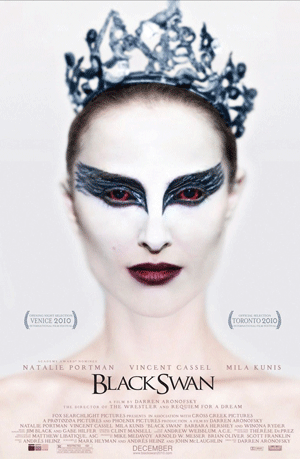 Black Swan (Rated R) Five Stars
Black Swan (Rated R) Five Stars
Darren Aronofsky is a competent director with a long list of arthouse specials. I admit to watching his films; I also admit that I have never watched any of his films twice. After watching Black Swan (108 minutes) that may change. It works as a companion piece to critical darling The Wrestler and takes a visual cue from its grainy 16M style. It is also reminiscent of metaphorical science fiction romance The Fountain.
The story is set in New York, of course. A ballet company is preparing for their new season by replacing the current diva, Beth MacIntyre (Winona Ryder) and raising one of the background dancers to prima ballerina. The top contender for the coveted position is Nina Sayers (Natalie Portman). Portman is surprisingly adept at playing the shy girl just begging to be Svengalied, since she so often shines in roles that highlight her unmistakable poise.
A new company dancer, Lily (Mila Kunis), is introduced. Her presence destabilizes the already wobbly Nina. Lily and Nina form the points of a triangle completed by director Thomas Leroy (Vincent Cassel). Leroy is unwilling to cast Nina in his new production of Swan Lake until he pushes her too far and finds out that this kitten has a whip! Even after she is cast she is far better at playing the innocent, fragile White Swan than the sexual and devious Black Swan.
Lily, on the other hand, mean girls her way into the position of understudy, and stands poised to step into the twin roles at the first opportunity. Or does she? One of the greatest strengths of the film is the inability of the audience to separate Nina’s fantasy from everyone else’s reality. Much like the psychological thriller Repulsion (if you loved Black Swan, Netflix Repulsion immediately, if not sooner), the camera forces us to accept the insanity of the protagonist as reality.
Nina is overwhelmed by the pressure of her new position, and more than a little naïve. Her mother (Barbara Hershey) doesn’t help matters with her bizarre drawings and inability to interpret the meaning of a closed bathroom door. Of course, her mother’s overprotectiveness is a bit more reasonable in light of Nina’s history of self-mutilation and erratic behavior … and her hallucinations involving both Doppelgangers and bloody wounds that suddenly appear on her body.
Kunis is totally believable in her role, and it is hard to tell if Lily is friend or foe. In a pivotal scene, the two opposites attract while gooseflesh ripples across the thighs and neck of Nina. It seems as if Nina will finally throw off the shackles of M-O-M, but her grip on reality is tenuous. The things that she sees become more grotesque as the story of Swan Lake infects her perceptions.
Losing her grip on reality releases her from her dry and
technical perfection, allowing her to finally embrace the passion
required to successfully dance the role of the Black Swan. The ballet is
nothing special until Nina becomes the Black Swan for the
second act. The third act moves inevitably into the tragic
conclusion of both the ballet and the movie. The only real
issue is with the final line of the movie, which comes off as
anticlimactic after such a
wrenching finale.

 How to resolve AdBlock issue?
How to resolve AdBlock issue? 








